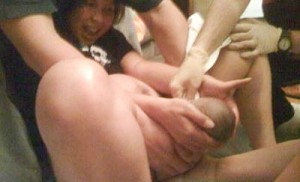 Okay, I’ll come out with it, finally, after all these years: I was desperately disappointed with The Vagina Monologues! I’m only now fessing up and lodging my opinion that the empress Eve Ensler has no new clothes on. In her supposedly ground-breaking play…two hours of dialogue and monologue dedicated (supposedly) to the sexual dimension of a woman’s psycho-anatomical makeup…there is not one single mention of <gasp> menstruation. No period, period.
Okay, I’ll come out with it, finally, after all these years: I was desperately disappointed with The Vagina Monologues! I’m only now fessing up and lodging my opinion that the empress Eve Ensler has no new clothes on. In her supposedly ground-breaking play…two hours of dialogue and monologue dedicated (supposedly) to the sexual dimension of a woman’s psycho-anatomical makeup…there is not one single mention of <gasp> menstruation. No period, period.
Oh, there are plenty of other reasons to not embrace TVM (or as Camille Paglia calls it, “the perversion of feminism that Ensler represents”), but I’m focusing on this one. Period. A woman’s attitude toward her menstrual period impacts how she lives, labors and births. Let’s outgrow the tired cultural perversions about our creative power as women!
I was inspired to revisit my period passion by Dr. Oz’s extraordinary segments last week, in which he boldly went where few men (or women) are ever willing to go — particularly in the benign waters of daytime network television: to the flow. And true to Dr. Oz’s style, he didn’t pussyfoot around (no pun intended): he invited women’s health and hormonal specialist Alisa Vitti to help women decode the bloody display they see in the toilet or on the pad for important information.
As thrilled as I was to see this happening in such a mainstream forum, I was equally saddened to hear what some women had to say about just looking at their own menstrual flow: “Ew.” “It grossed me out.” “It was just so disgusting.”
Let’s remember that what they are talking about is the nutrient-rich uterine lining that is lavishly prepared by our amazing bodies each and every month — in case a wee, potential human should happen along (in the form of a fertilized ovum) and need to embed itself there to begin growing. No fertilization, no need, and so we shed that source of nourishment as our monthly flow.
What Mothers Convey About Period Power
What was your mother’s attitude toward her period? This sets the tone for how we embrace, or subtly (and not-so-subtly) reject, our awesome but culturally taboo creative powers as women. I invite women to reconsider this intimate ecology, an ecology that was central to the late birth and environmental activist Jeannine Parvati Baker‘s work. In her landmark book Conscious Conception (written with Frederick Baker and Tamara Slayton) Jeannine invited women toward “an increased sense of trust and appreciation of their reproductive cycles — an invitation to reflect upon these cycles as a means of soul-making and spiritual development that will vibrantly color all aspects of our lives.”
And all aspects of our daughters’ lives! Whether our daughters are teens, grown (like mine), or just wee babies, it is in their interest as future fertile and well-birthing women that we as mothers do some womanly self-inquiry, and perhaps heal an intergenerational passage of attitudes: Are our bodies a locus of integrity, honor, power, or are they reservoirs of “unfresh” odors that need to be tamed with FDS? Are we empowered by the life-giving energies of our miraculous, mysterious bodies, or are we diminished by the onslaught of cultural messages that casually characterize those energies as “the curse”? By commercials that counsel young women about the best product to medicate away the entire experience, cheerfully pronouncing “your period is more than a pain (it’s bloating as well!)”?
(And don’t even get me going on the subject of the contraceptive pill that gets rid of the whole nasty business of menstruation altogether — yikes! Sistahs, don’t fall for it!) And, saddest of all, aren’t we all too familiar with apologetic monologues in which uncomfortable mothers hastily explain to their embarrassed daughters about “that time of the month” in terms that engender disgust and shame (or at the very least, apprehension) rather than a sense of the sacred privilege and power of fertility unfolding within them?
 True, privilege and power aren’t usually associated with our “visit from Aunt Flo”! But Jeannine Parvati urged us to reconsider the true meaning of our monthly moon time: “Menstruation is the red flag that salutes the hard work of the preparation for another conception. Modern women suffer premenstrually because they do not fully comprehend the magnitude of the psychic and nutritional preparation that is required to build a healthy lining for an embryo. Your body has not slackened off from its commitment to reproduction and pulls from every cell to fulfill this mandate.”
True, privilege and power aren’t usually associated with our “visit from Aunt Flo”! But Jeannine Parvati urged us to reconsider the true meaning of our monthly moon time: “Menstruation is the red flag that salutes the hard work of the preparation for another conception. Modern women suffer premenstrually because they do not fully comprehend the magnitude of the psychic and nutritional preparation that is required to build a healthy lining for an embryo. Your body has not slackened off from its commitment to reproduction and pulls from every cell to fulfill this mandate.”
In other words, our bodies and psyches work hard to create conditions for new life and our obliviousness to that fact (for many) brings suffering. In traditional cultures who abide by natural cycles of many kinds, menstruating (and likely pre-menstruating) women typically withdraw from many of their regular duties and activities, to have time and space for contemplation and self-nurturing. To me it makes sense that the modern multi-tasking woman might become irritable or snappish as something primitive in her may be urging her toward solitude but her culture has raised her to be machine-like: an unpausing, linear automaton rather than a cyclical, sacredly fertile woman!
Embracing the Power of Cycles
Jeannine dedicated her life to raising (or more accurately, restoring) women’s — and men’s — awareness of their connection to the earth and its cycles, and of the innate wisdom and power that resides in each of us. Dr. Jackie Guiliano, a professor of environmental studies, points out that early people knew they had to understand nature’s cycles and work with them, particularly the cycles of the moon. The new moon heralds the sowing of seed or the harvesting of crops. During the waxing moon, all things that need to grow must be tended to.
He reminds us that a woman’s menstrual cycle is indeed a powerful force that intimately connects women to the Earth and the moon. The average menstrual cycle is 29.5 days, the same as the cycle of the moon. Before the era of artificial light or chemical contraception, women may have ovulated and menstruated throughout the world at about the same time because of the moon’s influence! (Many women today have experienced the synchronization of menstrual cycles among woman who are living or working together. Do we pause to consider how amazing this is??)
Period Power, for Living, for Birthing
Women, our attitude toward our period — our very generativity! — in turn impacts how we live, how we labor and how we birth. In her writing and worldwide teaching Jeannine Parvati decried our modern alienation from our own bodies, from our knowledge of them and our trust in them. Not only is this bodily knowledge and trust fundamental to healthy birthing, it extends beyond individuals to our collective mother, our planet Earth. Jeannine believed that the “lack of attention to the care and maintaining of this planet is sharply reflected in the way we have ignored the messages from our own bodies.” Womb ecology, world ecology.
At any moment we choose, without renouncing our status as “modern women,” we can begin to reclaim our native connection to the earth, the moon and our own sacred, cyclical, powerful nature. I invite you to embrace this deep knowledge, in some really practical ways:
- Take note of the moon’s cycle, and begin to notice how much more successfully, for example, big projects and important events tend to flourish and attract lots of people and attention when scheduled during a waxing moon… and how much more intimately we can “go deep” with a small number of friends, or lovers, children — and most of all, ourselves — during a waning moon.
- And vice versa: if you’re hoping to attract a big audience to an event during a waning moon, you may be disappointed; but your small audience will want depth! The moon influences us all, whether or not we take notice.
We can take some healing cues from Jeannine Parvati’s stories about the evolution of her own “menstrual consciousness” in her classic Hygeia: A Woman’s Herbal. In one, she came to recognize the grief inherent in menstruation:
I intuited that there was no need to create a dramatic upheaval in my home, in order to get my mate to ‘make me cry’… I could re-own those feelings myself, and have a good cry, letting go of the egg, the hope, with my tears. Then the blood flowed easier and more pleasurably.
And (stay with me here), we can return our monthly flow to the earth, which — as “out there” as it sounds to us “civilized” gals — isn’t that hard and is surprisingly satisfying. In my last years of flowing, I would drop my organic cotton tampon into a cup or so of warm water in a pitcher dedicated to this purpose…let it soak a bit…then squeeze it out completely. (Yes, gals, I actually touched it!)
It’s an awesome fertilizer for your garden. But more importantly, points out Jeannine, it’s a good way to “get in touch” with your period: “Handling your … blood helps to discharge lots of our self-disgust, so inculcated by media, myths and poor health. …The handling of our own secretions will prepare you for the sometimes bloody experiences of childbirth, and other crises. Blood will cease to ‘freak you out.’”
In other words, it will help reconnect you to your period power!

Images:
Top two royalty-free/Corbis
Birth from WiseWomanChildbirthblogspot.com
Tags: Alisa Vitti, camille paglia, Dr. Oz, eve ensler, Jackie Guiliano, Jeannine Parvati Baker, menstruation, natural childbirth, period power, PMS, vagina monologues


